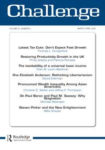This paper analyzes three contracts and shows that there is indeed a deeper democratic or Enlightenment classical liberal tradition of jurisprudence that rules out those contracts. The ‘problem’ is that the same principles imply the abolition of the employment contract, the contract for renting human beings, which is the foundation for the economic system that is often (but superficially) identified with classical liberalism itself. Frank Knight is taken throughout as the exemplary advocate of the economics of conventional classical liberalism.
Are Marginal Products Created ex Nihilo?
This is Chapter 5 from my book: Ellerman, David. 1995. Intellectual Trespassing as a Way of Life: Essays in Philosophy, Economics, and Mathematics. Lanham MD: Rowman & Littlefield.
When an orthodox economist considers the principle of people getting the fruits of labor, he or she will invariably interpret it in terms of marginal productivity. The orthodox claim is that under the conditions of competitive equilibrium, each unit of labor “gets what it produces.” Well-meaning capitalist liberals emphasize that actual capitalism may be neither competitive nor in equilibrium, and in any case, there are enormous difficulties in measuring the “marginal product of each factor of production.” In other words, they accept that interpretation of marginal productivity theory in principle but fuss about its applicability in practice.
The Kantian Person/Thing Principle in Political Economy
This is Chapter 4 in my book: Ellerman, David. 1995. Intellectual Trespassing as a Way of Life: Essays in Philosophy, Economics, and Mathematics. Lanham MD: Rowman & Littlefield.
Ethical theories can be broadly grouped into utilitarian theories and rights-based theories. Modern economics is so thoroughly utilitarian that most economists would be hard-pressed to cite the application of a rights-based argument to economic institutions. Yet the normative principles outlined in the first two chapters, the labor theory of property and the de facto theory of inalienability, are squarely within the rights-based tradition. The democratic principle of self-determination is also a closely allied rights-based theory [see Ellerman 1992].
Myth and Metaphor in Orthodox Economics
This is Chapter 2 from: Ellerman, David. 1995. Intellectual Trespassing as a Way of Life: Essays in Philosophy, Economics, and Mathematics. Lanham MD: Rowman & Littlefield.
Discussion of the fundamental questions of political economy is today almost completely clouded and distorted by a number of basic myths and metaphors. Deconstruction is necessary before constructive discussions can begin. The myths and metaphors are concerned with basic conceptions about property and contract, not with prices and markets. As layer upon layer of distortions are removed, new facts and new perspectives on old facts will emerge. These facts have fairly direct normative implications, but the disagreements and controversies are about the facts, not about norms or prescriptions.
Trespassing against the Happy Consciousness of Orthodox Economics
This is Chapter 1 in my book: Ellerman, David. 1995. Intellectual Trespassing as a Way of Life: Essays in Philosophy, Economics, and Mathematics. Lanham MD: Rowman & Littlefield.
This first chapter addresses the problems of trespassing involved in understanding the arguments presented in the first five “controversial” chapters of the collection. These chapters challenge the whole idea of the employer-employee relationship that is the institutional basis for our present version of a private-property market economy. The problems of trespassing against fundamental orthodoxy in the social and moral sciences are of a completely different order of magnitude than the problems of trespassing in the natural and mathematical sciences.
New Work for the Visible Hand of Business
This is an essay about the late Richard Cornuelle’s essay “New work for invisible hands” in a commemorative volume of Conversations on Philanthropy.
A Theory of Inalienability: Towards a Theory of Classical Liberal Jurisprudence
This is a draft paper that presents some of the arguments I have been making for years in a framework analogous to Type I and Type II error in statistics–which seems to clarify the arguments. Historically, the sophisticated arguments for slavery and autocratic government were consent-based in terms of implicit or explicit contracts. And the legalized oppression of married women was based on the coverture marriage contract. Hence the critiques developed in the abolitionist, democratic, and feminist movements were not simply arguments for consent as opposed to coercion, but arguments against certain voluntary contracts, e.g., in the form of inalienable rights arguments.
Review-Essay on Elizabeth Anderson’s “Private Government” book
In her recent book Private Government [2017], Elizabeth Anderson makes a powerful but pragmatic case against the abuses experienced by employees in conventional corporations. The purpose of this review-essay is to contrast Anderson’s pragmatic critique of many abuses in the employment relation with a principled critique of the employment relationship itself.
Listen Libertarians! A Review of John Tomasi’s “Free Market Fairness”
John Tomasi’s 2012 book, Free Market Fairness, has been well received. On the dust jacket, Tyler Cowen proclaims it “one of the very best philosophical treatments of libertarian thought, ever” and Deirdre McCloskey calls it a “long and friendly conversation between Friedrich Hayek and John Rawls — a conversation which, astonishingly, reaches agreement.”
Reframing the Labor Question
Subtitle: On Marginal Productivity Theory and the Labor Theory of Property
This paper reframes the labor question according to the normal juridical principle of imputation whose application to property appropriation is the modern treatment of the old natural rights or labor theory of property.






